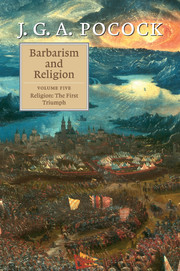Book contents
- Frontmatter
- Contents
- Preface
- Acknowledgements
- Advice to readers
- List of abbreviations
- Introduction
- PART I GIBBON'S ORTHODOX SOURCES
- 1 The Christian ancients: Eusebius and the Fathers
- 2 The Catholic moderns: history and authority
- PART II THE SOURCES OF PROTESTANT ENLIGHTENMENT
- PART III THE TWO CHAPTERS EXPLORED
- PART IV CONTROVERSY AND CONTINUATION
- Bibliography
- Index
1 - The Christian ancients: Eusebius and the Fathers
Published online by Cambridge University Press: 01 March 2011
- Frontmatter
- Contents
- Preface
- Acknowledgements
- Advice to readers
- List of abbreviations
- Introduction
- PART I GIBBON'S ORTHODOX SOURCES
- 1 The Christian ancients: Eusebius and the Fathers
- 2 The Catholic moderns: history and authority
- PART II THE SOURCES OF PROTESTANT ENLIGHTENMENT
- PART III THE TWO CHAPTERS EXPLORED
- PART IV CONTROVERSY AND CONTINUATION
- Bibliography
- Index
Summary
The purpose of the next five chapters is to enquire into the narratives of Christian history in the era before Constantine which were available to Gibbon and offer a context for the narrative of his fifteenth and sixteenth chapters. We turn initially to his ancient sources, written before or soon after Constantine's accession and ‘the establishment of the Christian religion’, and we necessarily begin with the Ecclesiastical History by Eusebius, bishop of Caesarea, considered the founder of this branch of historiography – though he made use of historical statements written before his time – because he was obliged to determine and expound the lines on which such a history must proceed. The Ecclesiastical History, written between 311 and 324, runs from the Ascension of Jesus Christ to the accession of Constantine; in civil history it is linked with Eusebius's life of Constantine, in sacred history with his Praeparatio Evangelica and Demonstratio Evangelica, which situate Christ in the actions performed by God in, or upon, human time. Eusebius here is less a source for the events, secular or sacred, of Constantine's reign than a shaper of the earlier narrative with which Gibbon necessarily interacted in writing the two chapters that conclude his volume of 1776; in particular the fifteenth, which dealt with the spread of Christianity. Gibbon attacked Eusebius's reliability and even veracity when writing of the persecutions and martyrdoms, but this issue does not yet concern us.
- Type
- Chapter
- Information
- Barbarism and Religion , pp. 21 - 45Publisher: Cambridge University PressPrint publication year: 2011



